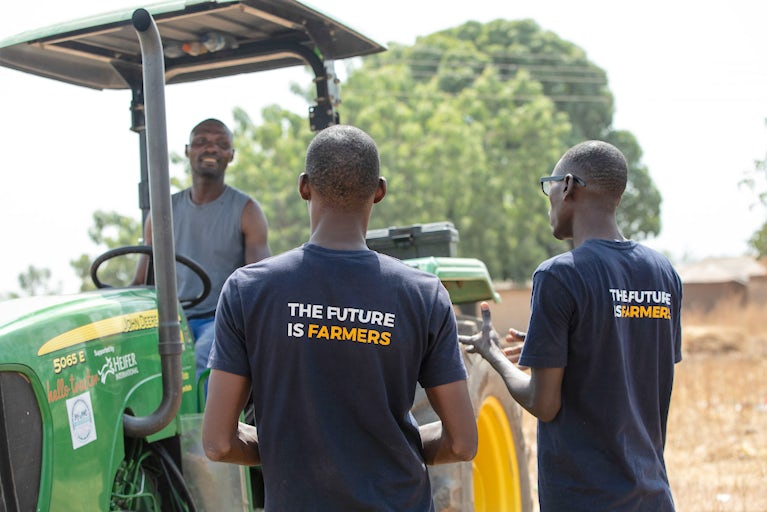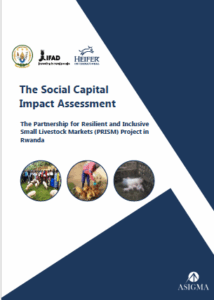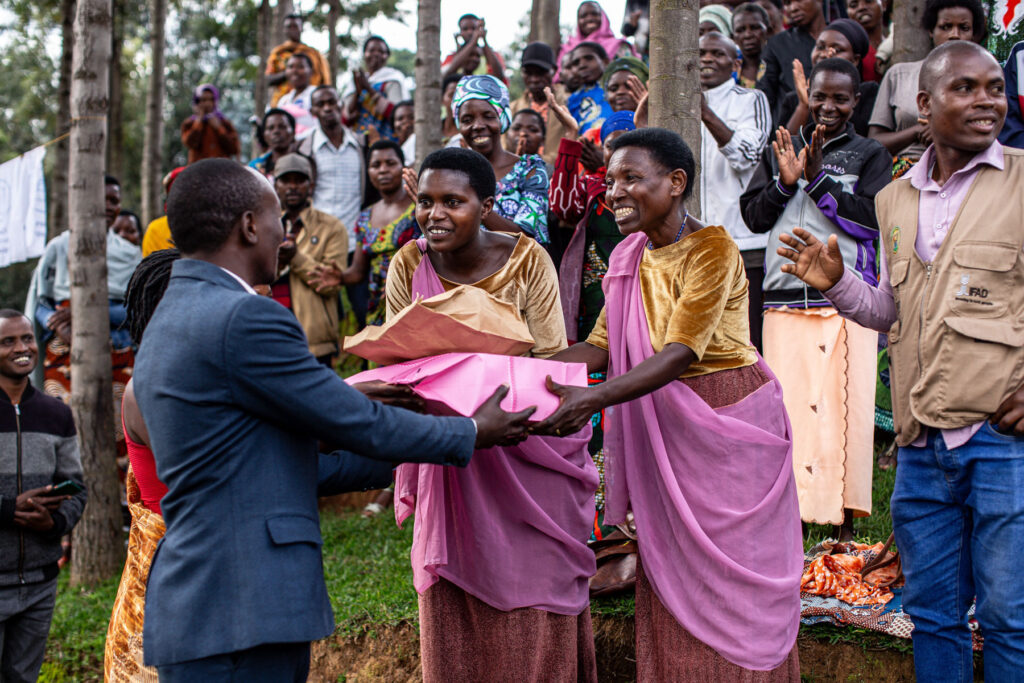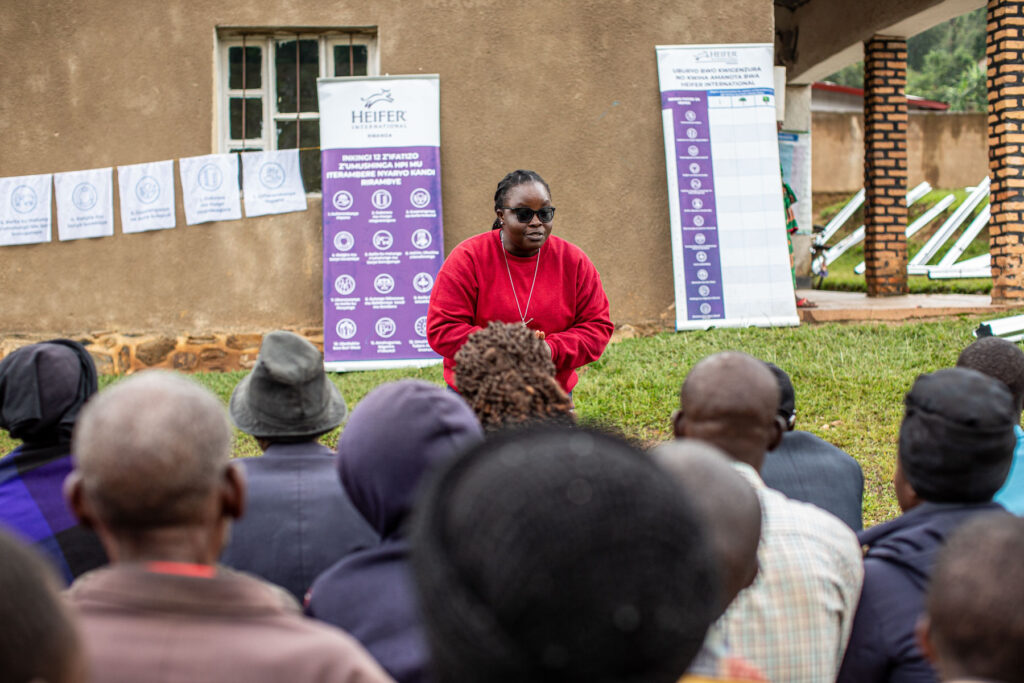
Report Finds Agricultural Finance Model Created by Heifer International and Hello Tractor Profitable, Effective
By Muthoni Ngure | August 26, 2025
November 12, 2025

When visiting a farmers group in any of the 15 districts where Heifer International’s Partnership for Resilient and Inclusive Small Livestock Markets (PRISM) project operates in Rwanda, one thing stands out: People speak with pride about what they have built together. It is not only the goats, the farmland or the improved animal sheds. It’s also something less visible but far more powerful — trust.
That trust is at the heart of Heifer International’s Values-Based Holistic Community Development model, which encourages sustainable, locally led transformation through strong community networks and shared goals. The approach helps families plan together, share knowledge and support one another to improve their farms and their lives.
A new independent study confirms that this community-led model is helping rural families earn more, work together and build resilience across Rwanda’s livestock sector.
The study — The Social Capital Impact Assessment — showcased Heifer’s work through the PRISM project, a five-year initiative led by the Rwanda Agriculture and Animal Resources Development Board and co-financed by the International Fund for Agricultural Development and Heifer International. The study covered 15 districts and 1,786 households, measuring how the model is strengthening cooperation and driving sustainable livelihoods in the goat, sheep, pig and poultry value chains.
The model is built on trust, which drives lasting community change. By organizing in self-help groups, families plan, save and make decisions together, building the skills and confidence needed for self-reliance.
The assessment found that this shift is transforming relationships at both household and community levels. Joint decision-making between husbands and wives increased from 98 percent to 98.7 percent, while cases of serious household conflict fell from 27 percent to 6.6 percent.
Community unity also increased significantly. Perceived social cohesion — how connected and united people feel within their communities — rose from 15.6 percent before PRISM to 56.9 percent after implementation, showing that families are communicating and cooperating more effectively.
Economic progress matched these social gains. Average annual household net income increased more than fourfold, from 258,688 Rwandan francs to 1,107,932 (from about $820 to $3,500) between 2022 and 2025. More than 80 percent of households now own productive assets such as livestock, land or improved housing.
Nutrition also improved. Before PRISM, more than half of households ate just one meal a day. Today, 39 percent eat three meals daily, up from 3.2 percent before PRISM. Those consuming one meal decreased to 5.3 percent from 54.4 percent — a change supported by increased food production and income at the household level.
Families are applying what they have learned. More than 97 percent of participants reported using new skills in livestock management, feed preparation, recordkeeping and budgeting.
Heifer’s long-standing Passing on the Gift tradition continues to drive transformation across PRISM project communities. Families that receive livestock agree to pass on the first female offspring to another household in need, along with what they’ve learned about animal care and management.
This simple act of generosity is multiplying impact across rural Rwanda. To date, PRISM has reached 35,920 households through 1,242 self-help groups, exceeding its target by 53 percent. Participants have passed on more than 150,975 animals, including chickens, pigs, goats and sheep, expanding opportunities for more families and strengthening community bonds.

Learning is spreading far beyond PRISM’s direct participants. About 95 percent of farmers reported sharing what they’ve learned with their neighbors, and 79 percent have seen others outside the project adopting the same practices.
Among these new adopters, 71 percent improved livestock management, 70 percent improved feeding and 63 percent upgraded animal housing. This peer-to-peer learning shows the power of social capital — knowledge that grows through trust, cooperation and local leadership.
“Before joining our farmers group, I used to sell eggs alone and never knew how to save,” said Annonciata Uwimana, a farmer from Gicumbi District. “Now we save together, plan our expenses and I have been able to buy a goat and pay school fees for my children.”
PRISM is helping farmers take steps toward stronger market engagement. Eighty-two percent of participants rated the model’s contribution to market participation as either “very good” or “good,” a strong indication of its perceived value. Overall, 90 percent rated the model positively across production, productivity and market participation combined.
The findings revealed that 65 percent of PRISM participants engaged in some form of value addition to their products. Common practices included frying and roasting pork (20.5 percent), boiling and selling eggs (17.5 percent), pork preservation and smoking (34.8 percent), and supplying bakeries and other clients with eggs (49.1 percent). Many participants reported using more than one of these approaches to increase income and reduce waste.
Farmers are increasingly engaging in income-generating activities. About 97 percent are producing or selling hay and silage, eggs, animal feed, or managing communal pig sheds and chicken brooding. Within that group, 59 percent are involved in producing animal feed, and nearly 48 percent are engaged in building livestock housing.
Technology use is also on the rise. Around 41 percent of participants now use digital tools to manage their farms and businesses. Nearly 39 percent make mobile payments, 14 percent use improved animal breeds to boost productivity and about 2 percent are experimenting with digital marketing to reach new buyers.

Beyond household-level gains, the assessment also evaluated PRISM’s overall effectiveness. It found that for every Rwandan franc invested, the project generated more than double the value in household income, demonstrating strong returns and the efficiency of Heifer’s community-led model.
As PRISM moves toward completion, Heifer Rwanda and its partners are connecting self-help groups to agribusiness opportunities, value-added enterprises and digital platforms that link farmers to suppliers and reliable, high-value buyers.
Through this work, the project is helping families earn living incomes — enough to cover their basic needs and plan for a better future — while building the foundation for sustainable, community-driven enterprises.
It’s a reminder that when communities are empowered to lead their own development, progress follows. Families who share knowledge, build trust and support one another are achieving sustainable growth and resilience that will last well beyond the project itself.
Cart is empty
Success!
Please be patient while we send you to a confirmation page.
We are unable to process your request. Please try again, or view common solutions on our help page. You can also contact our Donor Services team at 855.9HUNGER (855.948.6437).
Covering the transaction fee helps offset processing and administrative fees that we incur through taking payments online. Covering the transaction fee for each payment helps offset processing and administrative fees that we incur through taking payments online. Covering the transaction fee for each payment helps offset processing and administrative fees that we incur through taking payments online.